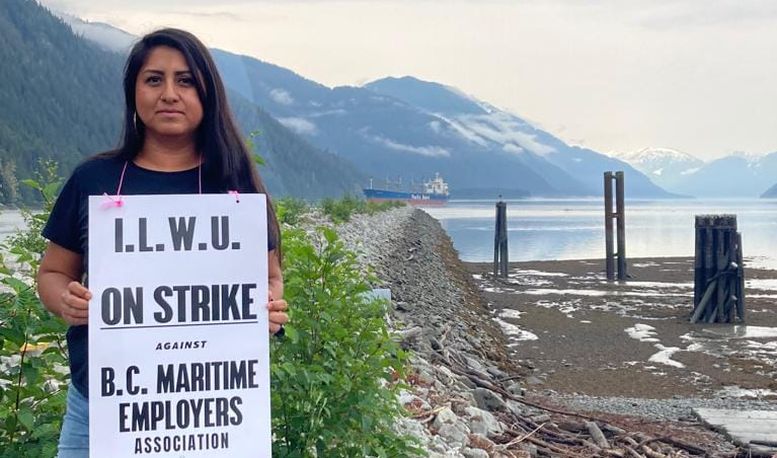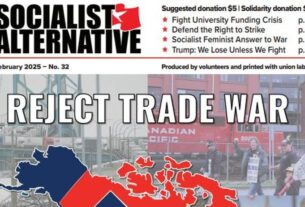Written by Socialist Alternative members in solidarity on the picket line.
The rollercoaster of the struggle of BC’s longshore workers has taken another turn with the announcement late on Sunday, July 30, that there was a new tentative agreement. This followed International Longshore and Warehouse Union Canada (ILWU) members voting to reject the proposals of the federal government’s mediator. Their big dissatisfaction was the failure of the proposals to address their real concerns about future jobs on the waterfront. ILWU members are standing up for young people.
The day after the result of the vote was announced on Friday, the federal Labour minister O’Regan stated he was considering either imposing a contract or binding arbitration. On Sunday the ILWU repeated its hope that the employers would negotiate and urged the “direct employers to come to the table and negotiate.”
The contents of the new proposed agreement have not been released, but there are rumours that it finally addresses the workers’ concerns about jobs. The union members are voting on this proposal until Friday, August 4.
The membership rejected the previous tentative agreement, in spite of being endorsed by the bargaining committee and the delegate caucus. Perhaps the employers and the government got the message at last — the workers have real concerns about jobs and these need to be addressed to get an agreement.
Jobs Matter: ILWU Fights for the Future
From the start of the negotiations and strike, the union leadership and membership made it very clear that job protection had to be part of any settlement. Time and again on the picket line workers talked about the threat of contracting out and automation.
Of course, the ILWU members wanted a pay increase to make up for the cut in living standards due to the soaring cost of living. Workers were angry at the profits companies were making off the backs of workers — “gouging,” one said. The rich are getting richer while young workers, especially, “can barely afford a place to live.” During the last three years of the old contract, workers’ wages did not keep up with the rising cost of living, but the bosses did just fine. A Jim Stanford report showed that the “six biggest global shipping lines control 70% of world shipping.” They are all members of the BCMEA, and five of the six (excluding MSC, which does not produce public records) “made over $100 billion in profits in 2022 — up 1500% since 2019.” An International Monetary Fund study stated that the higher shipping caused two percent of inflation in 2022. While Longshore and other “essential” workers stayed on the job and risked their health during COVID, the bosses sat safely behind their big desks and raked in profits.
Equally important is job protection. This is not mainly for the existing members but for the current “casuals” hoping to become full members and the future generations. There is a lack of good-paying jobs for many working-class young people.
The bosses want to increase the contracting out of maintenance to non-ILWU members. While this does not save the bosses money, it weakens the union’s power and the members’ job security. It can also undermine quality of work and safety, which has been another issue unaddressed, until now. The threat of automation to “kill jobs” hangs over the workforce.
This is not the first time workers have struck to protect jobs. The long bitter miners’ strike in Britain in 1984-85 was about jobs. Ontario teachers in 2019-20 carried out a series of one-day strikes involving up to 160,000 workers that successfully halted the Ford government’s plan to increase class sizes to 28 pupils and cut 6,000 jobs. Healthcare workers in many European countries have taken strike action this year demanding more staff. In 2020 Alberta’s health workers held a wildcat strike in defence of jobs, when threatened with massive cuts from the right-wing Kenney government.
The working class fights for the future. The bosses have no care for the future as they shed jobs for short-term profit. Even in the highly profitable oil patch they are cutting jobs.
Throughout most of the negotiations, the employer and the government largely ignored the issue of jobs. The employers’ association, the BC Maritime Employers Association (BCMEA), talked only about money in its media campaign. Of course, to the bosses money is the only priority, but the working class cares about the future.
Even the fight for human survival is secondary to profits in the bosses’ outlook. Fire is the other news that has dominated BC and elsewhere over the last month. Climate change is creating a “summer of hell” around the northern hemisphere. Yet the ruling class, and its politicians, including in Canada, is still hell-bent (literally) on building more pipelines, and pumping more CO2 into the atmosphere, ignoring the consequences for current and especially future generations. Climate disaster draws closer, and the ruling class accelerates on the highway to hell.
Government Backs the Bosses
The government and big business hate strikes that are effective — they can tolerate strikes only if they are ineffective. In their world view, the democratic right to strike does not include strikes that hit the bosses’ profits — those are sacrosanct.
For the last three weeks it has been clear that the federal Liberal government is on the bosses’ side. The government-appointed mediator came down overwhelmingly on the employers’ side. There were four main items in the negotiations: the length of the contract (ILWU wanted a two-year contract given the foreseeable economic uncertainty), an increase in wages to compensate for the rising cost of living, protection of jobs threatened by contracting out of maintenance work that is part of ILWU’s work and increased automation. The mediator backed the bosses on three of the four: recommending a four-year contract the bosses wanted and virtually nothing on contracting out and nothing on automation, again on the bosses’ side. On wages, the mediator recommended proposals between the government and the union. No wonder ILWU’s members have been unhappy with the earlier proposed agreements.
While the first tentative agreement (TA) was being discussed the union paused the pickets, but when that TA was rejected, the strike re-started. Incredibly, the government declared the continuation of the strike “illegal” as the union had not given 72 hours notice. The union is appealing this, as it “substantially interfered with the collective bargaining process” and weakened their bargaining position with the employer. However, it could take years to drag through the courts. It is noticeable that when the employers want a decision they get it in hours, while unions have to wait years for courts to decide in their favour.
Within a few hours of the union announcing the democratic decision of the membership on July 28, again the Liberal government was weighing in on the bosses’ side. While the government may not be using back-to-work legislation, it has been trying the same thing in practice, seeking to impose a contract on the workers that favours the bosses. At no point has O’Regan urged the employers to improve the offer. Heaven forbid that any of the billions in profits should be shared with the workers who produce the wealth.
From the start, big business, right wing-politicians and the employers screamed about the economic damage of the strike, but never criticized the employers, who refused to negotiate seriously and instead walked away from negotiations multiple times. It is the employers’ refusal to seriously negotiate that disrupted the flow of goods through the ports. Instead of negotiating, they ran to the federal Liberal government, who came down on the side of the bosses.
The employers knew the federal government was on their side, so dragged their feet on bringing forward any significant improvements in the proposals. If this tentative agreement does address job security, it is entirely the employers’ and governments’ fault that the dispute has lasted so long — they could have addressed these concerns at the start of negotiations. Instead, they hoped to weaken the union and keep their massive profits.
It may be that this agreement is not so good, that it does not adequately address the issue of jobs. This would be a setback for the workers and the union, unless it is again rejected. ILWU has the industrial strength to win this struggle.
Unions and the Courts
They have the power to stand up to the bosses and the government. Around 16 percent of Canada’s traded goods passes through BC’s ports — all handled by longshore workers. Vancouver is Canada’s largest port and Prince Rupert is the third largest. Big business claimed the strike was impacting between $500 million and $800 million of trade every day! They can afford to settle.
ILWU members are skilled workers. There are not 7,000 skilled longshore workers ready to scab. Untrained scabs would be a health and safety disaster and possibly do millions of dollars of damage to trucks, trains and ships. ILWU in the US had made it clear they will not handle strike-bound ships diverted from BC ports and there are logistical snarl-ups in the US and much higher costs to moving freight between US ports and Canada.
In the past when unions, including ILWU, defied the government, the courts were used to fine and imprison workers. However, the courts cannot imprison thousands of workers, and imprisoned workers cannot work in the ports.
Fines may temporally hurt the union. But a defeat on protecting employment is a bigger injury to the union. However, the real strength of any union is its members.
If the rest of the Canadian union movement stood in solidarity with ILWU, delivering on the pledges of support given at the large, inspiring rally on July 9, the government and employers would be forced to negotiate. The employers have plenty of money to afford a settlement.
In 1966, ILWU leaders were sent to prison for refusing to order longshore to work on a public holiday. As ILWU Local 500 wrote “the courageous actions of the union … taught the BCMEA … that the ILWU could not be intimidated by the unfair use of injunctions” [and] an “immediate result was the winning of statutory holiday rights for longshoremen.”
Canadian Postal Workers (CUPW) had to wage several strikes in defiance of the government but, in doing so, they won victories for all Canadian workers. In 1965, CUPW’s strike was called illegal but it won the right to collective bargaining for most public sector workers. In 2014, Port of Vancouver container truck drivers stated they would not accept back-to-work legislation. The port employers and government backed down. In 2022, Doug Ford threated back-to-work legislation against Ontario’s school workers. The Ontario Federation of Labour responded with a promise of a general strike and Doug Ford retreated.
The building of most of the unions in Canada and the US required workers to defy both the courts and the clubs and revolvers of police and company goons. ILWU was born in the illegal 1934 general strike in San Francisco. Bold, determined action can defeat government threats and bullying.
A victory for the BC longshore workers would be a victory for all workers.




